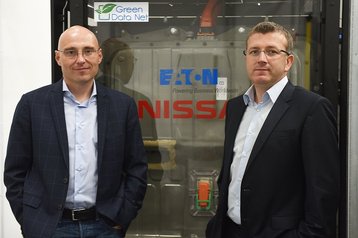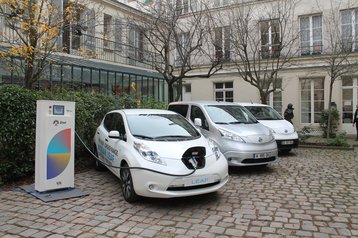Batteries from Nissan electric vehicles are being re-used to provide energy storage to a data center in France, enabling it to make better use of renewable sources, and reducing its dependence on the power grid.
The batteries are no longer suitable for use in Nissan Leaf vehicles, which use rechargeable units as a primary power source in place of carbon-based fuel.
Nissan partnered with power management company Eaton to install the batteries at the Webaxys facility in Saint-Romain-de-Colbosc, near Le Havre in Normandy, northern France.
Webaxys, a hosting company that operates another data center near Rouen, has plans to further extend use of the technology to new data centers in the region. It envisages construction of a third site in Caen, to be operational in 2017.
Established roots
Nissan and Eaton first announced in 2015 that they were working together on a project to deliver 100 percent renewable energy to data centers, from ‘second-life’ lithium-ion batteries after their first life in Nissan vehicles has ended, as reported in DatacenterDynamics.
The companies revealed that Leaf batteries combined with Eaton’s 93PM uninterruptable power supply (UPS) and solar photovoltaic technologies, providing the capacity to store and deliver up to 20kWh of energy for each battery.
This stand-alone energy storage and control package can manage energy consumption while connected to or independent of the grid.
The system can be used for ‘peak shaving’, a practice which reduces dependence on the grid by shifting to battery power when demand is high.
The cost of the unit will be around €10,000 for the UPS, and perhaps $400 to $500 per kWh of storage capacity, said Fabrice Roudet, program manager for data center automation solutions at Eaton.
“This installation at Webaxys marks an important historical moment for data centres in their quest to become energy autonomous in the near future,” said Gareth Dunsmore, Nissan Europe’s director of electric vehicles.
Cyrille Brisson, Eaton Electrical EMEA’s vice president for marketing, said: “The wide-ranging benefits of such a unit include continuity of supply, increased grid stability and efficiency, avoidance of peak energy tariffs and a reduction in the reliance on expensive fuels like diesel to compensate for no-grid or poor-grid situations.”
EU support
The system was borne of the Green Data Net consortium, of which Nissan and Eaton are members, a project that aims to increase the use of renewable energy in data centers. The €4.3 million ($4.79 million) project was conceived with financial support from the European Commission, which contributed €2.9 million ($3.23 million) of funding.
Nissan’s Leaf is the world’s best-selling electric car, but has recently experienced a slump in sales in the US, having shifted 5,793 units in the first half of 2016, compared to 9,808 units for the same period in 2015. Competition from the likes of Tesla and Chevrolet’s Volt has been cited as a reason for the decline.
The manufacturer in January 2016 introduced a 30kWh battery, and has announced plans to release a 60kWh battery that will allow for journeys of more than 200 miles on a single charge.


